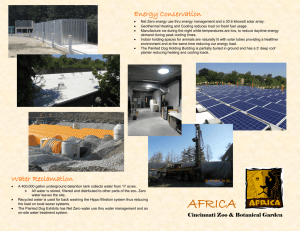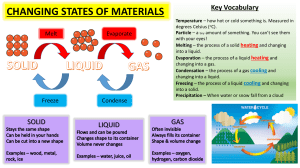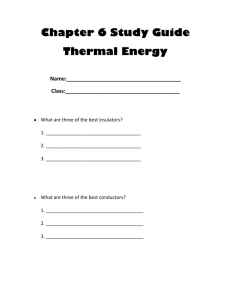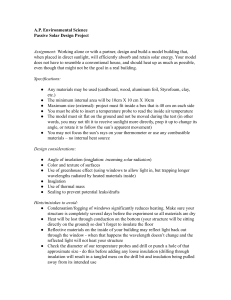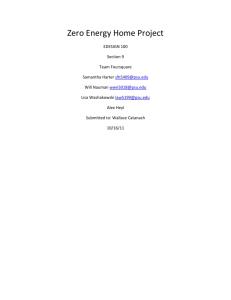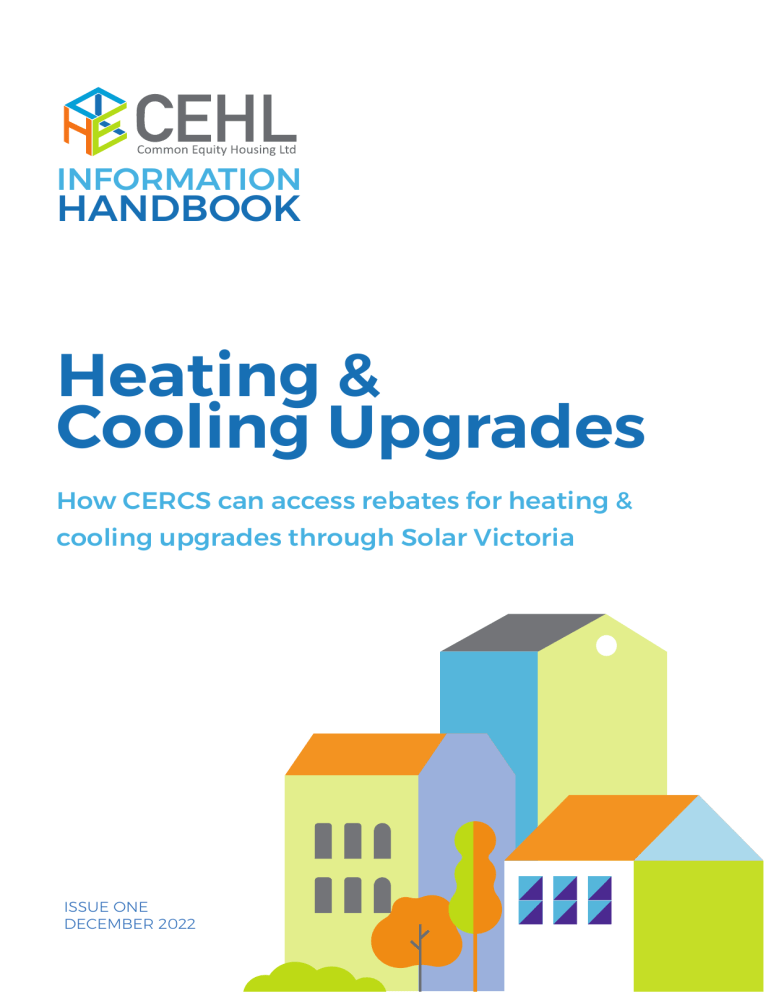
INFORMATION HANDBOOK Heating & Cooling Upgrades How CERCS can access rebates for heating & cooling upgrades through Solar Victoria ISSUE ONE DECEMBER 2022 Introduction Solar Victoria offers rebates and additional, supplementary funding for heating and cooling upgrades as part of the Home Heating and Cooling Upgrades (HHCU) Program (heatingupgrades.vic.gov.au) CEHL has been advised that all properties in the CEHL portfolio are eligible to access the rebates for Community Housing Organisations for the following upgrades: Installing an energy efficient split system in a home where no fixed heater is currently • installed (decommission not required) Replacing a gas space heater with an energy efficient split system and decommissioning the • gas heater Installing an energy efficient split system in a home with an existing gas ducted heater • (decommission not required) Replacing a fixed electric heater with an energy efficient split system and decommissioning • the electric heater. Replacing a reverse cycle air conditioner that is more than 7 years old with an energy • efficient split system and decommissioning the old air conditioner. Installing an energy efficient split system in a home where the only heating is a wood heater • (decommission not required). EMERGENCY REPLACEMENTS OF HEATERS Emergency replacements of heaters are difficult to fund via the Solar Victoria HHCU program due to the requirement to replace heating urgently (as per RTA requirements), particularly during the colder months. Here are some tips to potentially access funding in case of an emergency replacement: • Include all Co-op properties in the quotation of the supplier even members who aren’t interested in the heating and cooling upgrade yet. If an existing heater breaks down all documentation for a funding application can be collected quickly and you can contact Solar Victoria to inquire about funding for a single installation. • Check the functionality of the heater in late summer. If the heater isn’t working properly consider a funded upgrade before heating is required in the colder months. • Set up templates for all necessary documents and have all contact details on file to act swiftly in an emergency if a heater breaks down. 2 Information Handbook - Heating and Cooling Upgrades The Process Select properties for heating upgrades Submit application with Solar Victoria Contact accredited suppliers Provide documents to CEHL An eligible product must be installed by an accredited supplier in the renter’s main living space. These following pages detail the steps for co-ops to take to apply for funding. Information Handbook - Heating and Cooling Upgrades 3 STEP ONE Select properties for heating upgrades • Refer to property inspection data and/or contact all Co-op members to determine how many properties are heated using inefficient heaters (see above). • Confirm if members of these households are interested in upgrading to a more efficient heater. Make sure they understand that it means the existing heater will most likely be removed. • It may help to explain that making use of the Solar Victoria funding is good for the co-op’s finances - it saves the co-op money and reduces future maintenance liability for the CERC. • Refer to the Benefits of Transitioning to Electrical Appliances on page 8, to explain the benefits of the proposed upgrades. • Consider how many properties the co-op can afford to upgrade – there may be a gap between the rebate and the total cost of the upgrade. For example: • if the living area is large the new split system may cost more than the maximum $2,500 rebate • decommissioning of the old gas heater and “making good” the wall where the old heater used to be may cost more than $200 • a switchboard upgrade may cost more than $500 STEP TWO Contact accredited suppliers • Find an approved supplier on the Solar Victoria website (heatingupgrades.vic.gov.au/findapproved-supplier) to provide quotations for the installation of suitable approved products • Refer to the Solar Victoria website to find Approved Products (heatingupgrades.vic.gov.au/ approved-products). • Ask the supplier to do site inspections to determine whether gas decommissioning and/ or switchboard upgrades are required for the upgrade, because this can be included in the funding application. • Provide Solar Victoria’s Template Example Quote HHCU 2022 (on page 7) to your suppliers to avoid incorrect or incomplete quotations/invoices Solar Vic will reject. • Choose your preferred supplier once they submit the quotes to you. If a supplier asks you for a ‘token’ please advise the supplier, you will access funding from Solar Vic Homes Heating and Cooling Upgrade scheme for community housing organisations. 4 Information Handbook - Heating and Cooling Upgrades STEP THREE Provide documents for self-funded modifications to CEHL for approval • Provide documents for self-funded modifications to CEHL for approval • Provide an explanation of how the co-op can afford any costs not covered by the Solar Victoria rebate - explain what funds the co-op has available to meet urgent and essential maintenance costs throughout the year. Will there be sufficient left over after the upgrades have been paid for? • Provide an explanation of how the co-op has selected the properties proposed to have heater replacements - consider things such as – what is the reason some properties are included and others aren’t? Is it equitable? • Copies of the quotes • Completed self-funded modification forms for each property, signed by at least 2 directors. Form available here: https://www.cehl.com.au/Attachment?Action=Download&Attachment_id=148 Please send the above documentation to PropertySupport@cehl.om.au CEHL will: • Contact the co-op to clarify any details if necessary • Assess the Co-op funded modifications • Provide CEHL’s Letter of support with the unique Property Identification numbers (PINs) Required by Solar Victoria • Provide a copy of the Solar Victoria Installation Tracking Spreadsheet for the CERC to fill in Information Handbook - Heating and Cooling Upgrades 5 STEP FOUR Submit your HHCU funding application with Solar Victoria Collect all documents required for the funding application: • A copy of your co-op’s CCA First Schedule, this the evidence that your co-op manages the properties owned by CEHL • The letter of support provided by CEHL containing the PINs • The completed Installation Tracking Spreadsheet, listing the properties applying for funding. Use the Property Information Numbers (PINs) provided by CEHL in the Letter of Support in the Tracking Spreadsheet • Itemised quotes for each installation • Planned dates for installation as advised by your supplier/installer- Solar Victoria will need to include this in your funding agreement as your milestone date for completion • Nominate one co-op member to be the contact person for Solar Victoria Submit all of the above in one email to: CHO@team.heatingupgrades.vic.gov.au Solar Victoria HHCU Program Approval & Payments Process After your co-op submits its funding request: • Wait for the Funding Agreement to be signed by Solar Victoria and returned before commencing works. • After the Funding Agreement has been signed and returned, instruct your supplier to carry out the work as per CEHL Approval of Self-Funded Modifications. Photo documentation of the conditions before and after is essential for funding to be awarded. • Once the work is completed satisfactorily, pay the supplier • Forward the supplier’s paid invoices, photo documentation, Plumbing Compliance Certificates, and Certificates of Electrical Safety to Solar Victoria for payment for the rebate to the co-op. Payment usually takes two weeks after receiving evidence of works been carried out. Enjoy all benefits of the energy efficient heating - and cooling - upgrade! 6 Information Handbook - Heating and Cooling Upgrades Example quote, including details required for Solar Victoria Information Handbook - Heating and Cooling Upgrades 7 Benefits of Transitioning to Electrical Appliances Managing the energy efficiency upgrade works as part of the Maintenance Stimulus Works for the last 12 months, CEHL has experienced some renters refusing to replace gas appliances with energy efficient appliances such as electric hot water heat pumps and reverse cycle split systems. Many of the commonly quoted benefits In recent times the position on gas has for gas appliances also apply to electric changed: appliances: • • • Convenient – instant, on-demand available, low-cost energy option, supply. however it is no longer the case, as gas prices continue to increase as prices Versatile – heating, hot water, are linked to higher international cooking with same fuel all possible demand with electric appliances plus cooling • • Low maintenance – electric While gas may have been a lower emission option in the past, the appliances have the same life span/ electricity market is rapidly changing warranty periods as gas appliances • Gas, in the past, has been a readily to renewable energy and ‘decarbonising’ with a lower output of Cheaper – reverse cycle split systems greenhouse gas emissions. and electric hot water heat pumps have been proven to be four times • more efficient and therefore cost- Gas has been identified as a pollutant in homes, particularly affecting effective options (Choice study). vulnerable people. Electricity doesn’t produce pollutants like carbon monoxide, water vapour or nitrous Converting to electric appliances dioxide in homes, so it is safer. prepares the home to achieve the maximum benefit from solar panels • Solar panels installed on a home that still has gas heating, hot water and cooking means that much of Reference documents: • Maketheswitch.org.au • energynetworks.com.au/news/energyinsider/2021-energy-insider/banning-new-gas- the solar electricity generated will not be used in the home. Exporting solar to the grid does not earn as connections/ • Renew.org.au/renew-magazine/all-electric/gasdays-over-money-saving-results-in-Melbourne much money for the household as it would save by using the solar • Greenmoves.com.au/how-to-get-off-gas within the home to power electric • Choice.com.au/home-and-living/heating/home- appliances heating/articles/what-is-the-cheapest-way-toheat-your-home-this-winter 8 Information Handbook - Heating and Cooling Upgrades
